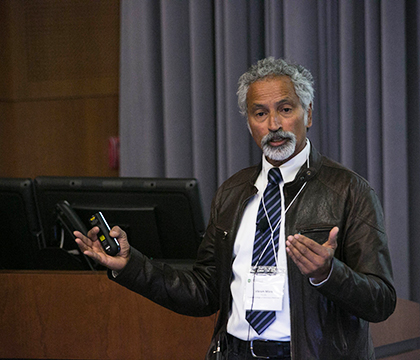
One Health: collaboration is key
Ask Dr. Vikram Misra about who should come up with solutions to global health issues and the virologist's answer may surprise you.
By Caitlin Taylor"I think health is way too important to leave to the scientists and health care professionals," says Misra.
It's not the response you would expect from someone who has been part of veterinary research and academia for nearly four decades — but that's exactly the message that Misra hopes to share in his role as director of the One Health Initiative at the University of Saskatchewan (U of S).
This initiative supports optimal health for people, animals and the environment through the collaborative work of interdisciplinary professionals – including both experts in the health sciences and those in other fields.
"One Health problems are usually quite complex. Solving them requires collaboration between people with vastly different kinds of expertise," explains Misra, a professor at the Western College of Veterinary Medicine (WCVM) who specializes in virology and molecular biology.
This combined approach to health care is gaining momentum across the globe. Three years ago, the U of S committed to making One Health a priority on campus through key initiatives. The list has grown to include an international graduate training program, a postdoctoral fellowship program, a leadership conference for undergraduate students and research funding for One Health-related topics.
In 2014 Misra and his team of researchers received one of the university's four inaugural grants in support of One Health research. Their study focused on disease spillover from bats to humans, specifically looking at which factors lead to increased virus shedding. Many researchers worked on the project from several U of S departments as well as other universities in North America.
"We have a number of people trying to work on the problem. The One Health grant has allowed us to synergize all of our activities toward that goal," says Misra.
For the past two years, applicants looking for research funding through the One Health Initiative have been responsible for finding experts in other fields who were willing to collaborate on their projects. This year, Misra organized a symposium to bring together U of S professionals to help build interdisciplinary research teams and to promote One Health.
"This year I thought it would be good to try something different — simply because we really don't know what sort of expertise is out there," says Misra.
The day-long symposium, which took place on April 29 in Saskatoon, attracted more than 100 people from across campus.

Throughout the day, the group heard about One Health initiatives that are taking place around the world and at North American universities including Carleton University in Ottawa and Washington State University in Seattle. They also listened to presentations by researchers from each of the four inaugural U of S projects funded in 2014. During the evening, the group heard from Dr. Suresh Pillai – a professor of microbiology from Texas A&M University.
Before the symposium took place, a handful of participants submitted brief outlines of proposed research projects. In the afternoon, organizers set up the projects in separate rooms and then encouraged people to walk around, review the proposals and contribute their expertise.
Proposal topics included the health of new-to-Canada refugees, the effect of pesticides on bees and food insecurity in First Nation communities. Groups have one month to submit a finalized proposal for a chance to receive funding.
"The big purpose [of the symposium] was to get people thinking differently about One Health problems. The purpose of the afternoon was for people to look at these problems and see if they could contribute to their solving," says Misra.
He believes the afternoon collaborations were successful at shaping some promising research studies for the coming year.
"There was a very noticeable difference between what people proposed and what they eventually came up with as a result of the discussion and input from others," says Misra.
The symposium's goals of sparking a new way of thinking about health-related issues and to spread awareness of One Health on campus will continue to be important as the U of S prepares to host the International One Health Congress in June 2018.
The congress aims to bring together about 1,500 delegates from around the world to share their work and create new research collaborations. Saskatoon will be the first North American city to host the congress that began in 2011. Previous conferences took place in Melbourne, Amsterdam and Bangkok.
In the meantime, Misra will continue spreading the message of collaboration and inclusion when it comes to solving issues related to human, animal and environmental health.
"Using One Health is how we need to solve problems – to collaborate in new ways and to look at problems from different points of view," says Misra. "We must collectively fix things. I think that's the future and that is why I am excited about what we are trying to do with One Health."
